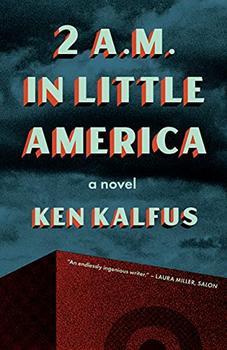Summary | Excerpt | Reviews | Beyond the Book | Readalikes | Genres & Themes | Author Bio

Many of the images were generated by my own self, so that I was always accompanied on my travels to the city, under my own surveillance. Copies of Ron Patterson and his toolbox echoed between the mirrored surfaces ad infinitum. But they weren't precise copies, probably because of something having to do with the surface optics, and they often made him look older or thinner, more American or less so, less worn or more athletic, smarter or less lonely, suggesting the other fellows that were contained within him, the fellows that could have been him, if events had turned out differently.
***
Compared to the skyscraper rooftops, which were noiseless save for the winds, the enclave's basements were as clamorous as train stations, kindergartens, and football stadiums. First, I would often hear the sound of other people speaking and moving elsewhere in the building. And then the structures creaked, water dripped, rats skittered just beyond the reach of my light, the country's indigenous cockroaches made little tap-tap-tap noises, and there were always a few other sounds I couldn't identify. Plus, occasionally, I heard a human step very close, a shuffle, a breath, whatever emanations might signify a human presence. I'd put on a friendly, harmless smile while I waited for the person to appear. There was nobody ...
... until there was. This time I hadn't heard a thing. I was in a small alcove in a sub-basement, closing the panel of a unit I had just inspected. As I turned, a bulky figure presented itself and occupied virtually the entire doorway.
This must have given me a start, but I quickly recovered.
"Hi, how are you?" I said in the local language. "I'm just finishing up here, everything checks out."
The light was so poor that I could hardly see the man's face or its expression. But he was obviously a native person.
He gazed at me. Then he looked down at a pocket-sized notebook.
"You're Ron Patterson, I believe," he said in heavily accented English. "An American."
"Yes sir," I said. I told him who I worked for.
He nodded, confirming this with whatever was written in his notebook.
The man didn't say anything for a while. His presence seemed to expand until it filled every space in the room. I couldn't get past him, of course.
He finally spoke, staying in English with some difficulty. He told me that he was a police detective. He told me his name, a random assortment of affricates and diphthongs that I couldn't possibly retain. He said he was assigned to the enclave, which I guessed from his manner was an unhappy assignment, perhaps a demotion. He was sent here because he spoke some English. He said his mother had been Irish, though I observed nothing about his features that were remotely Irish. He was responsible for the safety of American migrants, he explained. This declaration would have come off as idealistic or even pompous if his command of the language had been more confident.
He was, I thought, a sad and awkward person. I had no doubt about his bulk, however, and his capacity to throw it around, if necessary. Although the police in this country didn't commonly carry guns, he reserved the other prerogatives attached to the police of most countries. And, perhaps, in this rough neighborhood, he did indeed carry a gun.
"You need to help me," he said, his words sinking into my gut like one of the hamburgers. "You have a responsibility. You have to protect your people."
"What people?"
"The American people," he intoned, sounding like an American politician, except for the nearly confounding accent and mispronunciation. "You can go anywhere in the district, any building. Good. Continue with your inspections. But you need to open your eyes and ears. Tell me what the gangs are doing, what they're planning. I have to know about any kind of conflict that might happen. I'm here to save American lives."
Excerpted from 2 A.M. in Little America by Ken Kalfus. Copyright © 2022 by Ken Kalfus. Excerpted by permission of Milkweed Editions. All rights reserved. No part of this excerpt may be reproduced or reprinted without permission in writing from the publisher.
Your guide toexceptional books
BookBrowse seeks out and recommends the best in contemporary fiction and nonfiction—books that not only engage and entertain but also deepen our understanding of ourselves and the world around us.